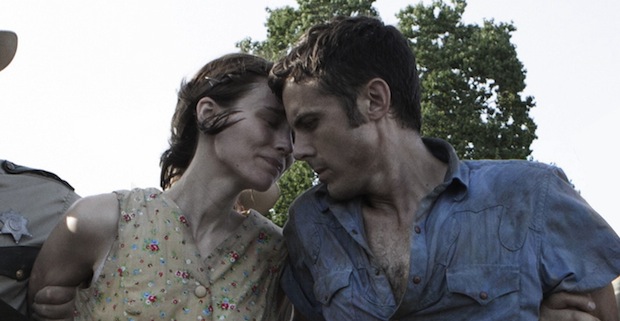
Movie: Ain’t Them Bodies Saints
Director: David Lowery
The brooding, dreamlike landscapes of Ain’t Them Bodies Saints will inevitably invite comparisons with Terrence Malick’s Badlands, not least because both films focus on a pair of young and star-crossed lovers. However, David Lowery’s gorgeous indie is a decidedly more localized, intimate film than Malick’s masterwork, rich in atmosphere and feeling and evocatively realized with all the heart and poignancy that defines its key relationship. It’s a deceptively simple story with decidedly few characters – and, indeed, events – but one which manages to create a engrossing portrait of dreams and promises and a simplicity of life. At its best, it comes across as a kind of rural fairytale, one in which broken homes and dreary backwater towns have replaced wishful thinking and enchanted forests. It’s languid and drifting, and its sleepy pace does cost it somewhat in the third act, but in its intricate evocation of desires and longing it will stay with you long past the credits.
The film tells the story of Ruth (Rooney Mara) and Bob (Casey Affleck), a young couple who have just discovered they’re having a baby. Their joy is fleeting however as, during a heist, they become embroiled in a shoot-out with police, during which Ruth shoots and injures an officer. Bob takes responsibility for the crime and is jailed. Ruth returns to their home town and later gives birth to a daughter, Sylvie, whom she raises alone over the following four years while Bob plans a daring escape from prison.
Perhaps strangely for a film that has been fêted at numerous international festivals this past summer, Ain’t Them Bodies Saints is a stunningly simple piece of work. It’s beautifully shot and realized, but its themes are specific and its story focused squarely on the experiences of two people. It doesn’t attempt to say anything grand or meaningful about the wider world in which we live, but uses the intricacy of a bond and a relationship to delve deeper into the human soul. The film unfolds in a series of willowy, thoughtful vignettes, narrated in part by voiceover excerpts from Bob’s letters to Ruth. In juxtaposing his hazily recalled memories of his lover with the distinctly ordinary reality of her life, it can be at once beautiful and recognizable, idealized and mundane. Bob’s vision of reality is presented as gleaming and dreamlike, bathed in the sunlit lustre of yesteryear. Ruth’s is a starker, more pedestrian existence, and while her feelings for him are never in doubt her daily life is never shown to be wanting for his absence. In this sense, the film is an evocation of a bond between two people that is both fleeting and eternal. Bob’s incarceration allows him to keep the dream alive, while Ruth reconciles such youthful promise with the searing dullness of living.
Both Affleck and Mara excel as the ill-fated lovers, Mara’s delicate visage in particular doing much to evoke the poignant emotions at the story’s core. Ben Foster also scores well as the victim of the shooting, who later takes a kind-hearted interest in Ruth and her daughter. There are hints at a potential romance between the two, his earthy sincerity appearing warm and wholesome next to the images of Bob and Ruth together. In this way, the film finds heart in the ordinary. While it is poetic, befitting its lofty title (apparently an inaccurate transcription of song lyrics), its most meaningful moments lie not in the hazy glow of the past but the comforting interactions of the present – Ruth and Sylvie’s mother/daughter rituals, Patrick’s well-meaning gestures, the lovers’ long-awaited reunion. It is thoughtful but also attentive, and compelling for its look at both dreams and days.
Vividly photographed and lyrical in its look at these ineffectual lives, Ain’t Them Bodies Saints is a touching and rewarding film. Its sleepy pacing will alienate some, as will its insistence on telling a very minimalist story, but its rich tapestry of emotions will move right-minded cinema goers. Its discovery of something sublime in the most human and universal of interactions is transformative, building to a poignant conclusion that’s no less involving for its inevitability.
SCORE: A
Review written by Grace Duffy
- David Fincher’s ‘Gone Girl’ Gets An Icy New Trailer - July 7, 2014
- SCENE & HEARD: ‘Jersey Boys’ - June 27, 2014
- MOVIE REVIEW: ‘Snowpiercer’ - June 21, 2014
